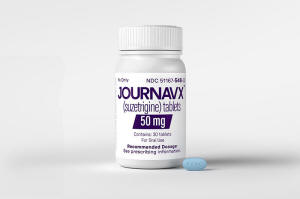FDA approves painkiller designed to eliminate the risk of addiction
associated with opioids
 Send a link to a friend
Send a link to a friend
 [January 31, 2025]
By MATTHEW PERRONE [January 31, 2025]
By MATTHEW PERRONE
WASHINGTON (AP) — Federal officials on Thursday approved a new type of
pain pill designed to eliminate the risks of addiction and overdose
associated with opioid medications like Vicodin and OxyContin.
The U.S. Food and Drug Administration said it approved Vertex
Pharmaceuticals' Journavx for short-term pain that often follows surgery
or injuries.
It’s the first new pharmaceutical approach to treating pain in more than
20 years, offering an alternative to both opioids and over-the-counter
medications like ibuprofen and acetaminophen. But the medication’s
modest effectiveness and lengthy development process underscore the
challenges of finding new ways to manage pain.
Studies in more than 870 patients with acute pain due to foot and
abdominal surgeries showed Vertex’s drug provided more relief than a
dummy pill but didn’t outperform a common opioid-acetaminophen
combination pill.
“It’s not a slam dunk on effectiveness,” said Michael Schuh of the Mayo
Clinic, a pharmacist and pain medicine expert who was not involved in
the research. “But it is a slam dunk in that it’s a very different
pathway and mechanism of action. So, I think that shows a lot promise.”
The new drug will carry a list price of $15.50 per pill, making it many
times more expensive than comparable opioids, which are often available
as generics for $1 or less.

Vertex began researching the drug in the 2000s, when overdoses were
rocketing upward, principally driven by mass prescribing of opioid
painkillers for common ailments like arthritis and back pain.
Prescriptions have fallen sharply in the last decade and the current
wave of the opioid epidemic is mainly due to illicit fentanyl, not
pharmaceutical medicines.
Opioids reduce pain by binding to receptors in the brain that receive
nerve signals from different parts of the body. Those chemical
interactions also give rise to opioids' addictive effects.
Vertex’s drug works differently, blocking proteins that trigger pain
signals that are later sent to the brain.
"In trying to develop medicines that don’t have the addictive risks of
opioid medicines, a key factor is working to block pain signaling before
it gets to the brain,” Vertex’s Dr. David Altshuler, told The Associated
Press last year.
[to top of second column]
|

This photo provided by Vertex Pharmaceuticals in January 2025 shows
a tablet and bottle of the JOURNAVX (suzetrigine) medication.
(Vertex Pharmaceuticals via AP)

Commonly reported side effects with the drug were nausea, constipation,
itching, rash and headache.
“The new medication has side effect profiles that are inherently, not
only different, but don’t involve the risk of substance abuse and other
key side effects associated with opioids,” said Dr. Charles Argoff of
the Albany Medical Center, who consulted for Vertex on the drug's
development.
The initial concept to focus on pain-signaling proteins came out of
research involving people with a rare hereditary condition that causes
insensitivity to pain.
Vertex has attracted interest from Wall Street for its ambitious drug
pipeline that involves winning FDA approval for multiple drugs across
several forms of chronic pain, which generally represents a bigger
financial opportunity than acute pain.
But the Boston drugmaker's share price plummeted in December when Vertex
reported disappointing mid-stage results in a study of patients with
chronic nerve pain affecting the lower back and legs. The drug didn't
perform significantly better than placebo, the research found.
“We believe the data reflect a near worst-case scenario for this key
pipeline program,” biotechnology analyst Brian Abrahams said in a
research note to investors, adding that the results jeopardized
estimates that Vertex's pipeline could be worth billions across multiple
forms of pain.
Still, Vertex executives said they plan to move forward with a new,
late-stage study of the drug, theorizing that a different trial design
could yield better results and pave the way for FDA approval in chronic
pain.
___
AP video journalist Mary Conlon contributed to this story from New York.
All contents © copyright 2025 Associated Press. All rights reserved
 |